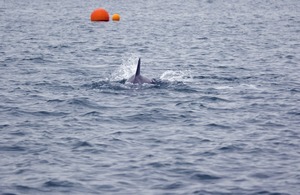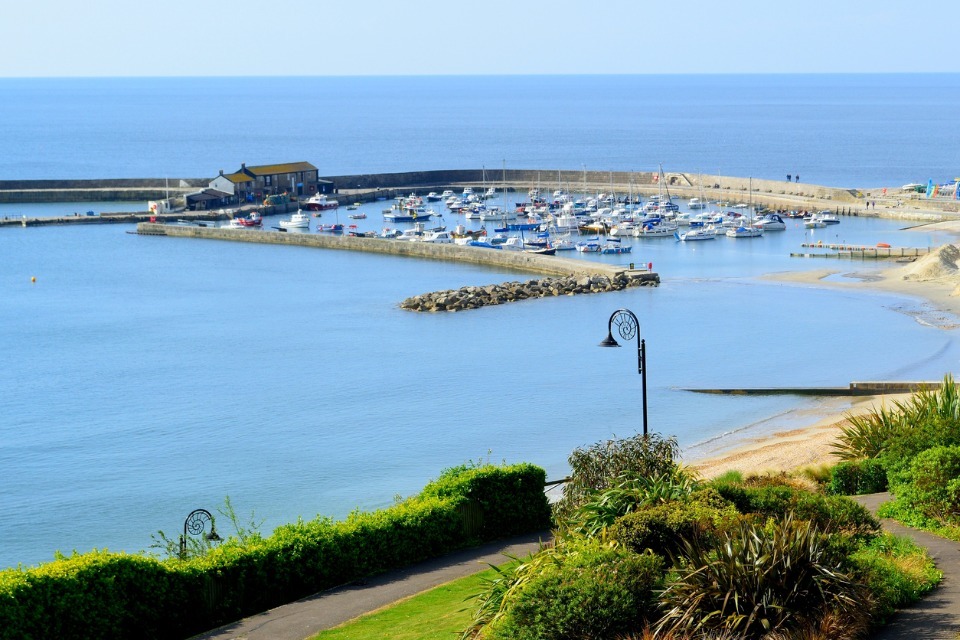Wildlife and marine conservationists warn of potential wildlife disturbance offences in response to Lyme Regis’ Dolphin visitor
In response to the arrival of a solitary dolphin in Lyme Regis and observation of potential marine wildlife disturbances, MMO, Dorset Police and Dorset Wildlife Trust are issuing guidance under the banner of Operation Seabird.

Dolphin at Lyme Regis
A solitary bottlenose dolphin has become a frequent visitor to the area just outside Lyme Regis harbour, sparking excitement from both residents and visitors. However, marine wildlife bodies and conservation authorities are issuing guidance following direct observation, reports, and video of people intentionally approaching the animal too closely.
The Marine Management Organisation (MMO), Dorset Police and Dorset Wildlife Trust remind everyone that dolphins, whales and porpoises are protected by law. It is an offence to intentionally approach or recklessly disturb these animals and could result in up to six months in prison and/or an unlimited fine.
Although seeing dolphins in the wild can be a special experience, irresponsible behaviour, particularly from those swimming, paddleboarding, jet-skiing or operating watercraft, can place the animal, or yourself at risk.
Jess Churchill-Bissett, Head of Marine Conservation (wildlife), said:
The arrival of a dolphin in a small coastal community like Lyme Regis can be a source of wonder and pride. But it’s vital to remember that dolphins are vulnerable and unpredictable wild animals protected by law. We all have a responsibility to respect their space, keep a safe distance, and understand how our actions can unintentionally cause harm or even constitute a criminal offence. By giving these animals space, observing them from a distance and acting responsibly we help ensure their health and survival, so they remain a part of our coast now and for generations to come.
If you encounter a Dolphin when you’re on the water, you should:
- Slow down and keep speed below six knots (no-wake speed).
- Stay at least 100 metres away and slowly move further away if you notice signs of disturbance.
- Keep your distance if there are already more than two boats or watercraft in the vicinity.
- Never encircle or chase animals.
- Never try to swim with, touch or feed them.
Sometimes dolphins may choose to approach you, in this situation you should maintain a steady speed and direction and let the animals leave when they choose.
If you see a dolphin being disturbed, you can:
- Contact your nearest MMO office: Contact your local Marine Management Organisation office - GOV.UK or email conservation@marinemanagement.org.uk
- Call local police on 101, stating ‘Operation seabird’ to report marine wildlife disturbance.
- In Dorset incidents can also be reported to the local Dorset Wildlife Trust team: kimmeridge@dorsetwildlifetrust.org.uk
Sarah Hodgson from Dorset Wildlife Trust, said:
Disturbance can be a big problem for wildlife from seabirds to seals and dolphins. It can affect their natural behaviour, interfering with foraging, disturbing crucial resting time, causing stress and may result in injuries or worse. That’s why it’s so important to follow the Marine and Coastal Wildlife Code, so you can enjoy your time on the water without having a detrimental impact on our precious marine wildlife.
Find out more: www.gov.uk/government/publications/marine-and-coastal-wildlife-code
Sergeant Ryan Prater, of the Dorset Police Marine Unit, said:
We are fortunate here in Dorset for people to be able to visit and enjoy our spectacular Jurassic Coastline, a UNESCO World Heritage Site which stretches for 95 miles from Studland in the Purbeck area of the county to Exmouth in East Devon.
This coastline is home to many species of marine animals and wildlife and as we go into the busy summer season, it is important that those visiting our beautiful coastal areas consider the well-being of marine wildlife and take steps to prevent any unnecessary disruption.
In recent years, we have seen whales, seals, dolphins and other unexpected marine wildlife appear on our coastlines and so it is important that the public keep a safe distance from them.
Protecting our coastline is something we take very seriously, and we will continue to work closely with our partners – including the Marine Management Organisation – to ensure marine animals are able to live safely in their natural environment, free from human disruption.
We will continue to investigate offences reported to us under the 1981 County and Wildlife Act and, where necessary, take proportionate action.
I urge anyone who has information or concerns about wildlife crime or disturbance to report it to us. If a wildlife crime is happening now, call 999. Otherwise, information can be provided by calling 101 or using the form on the Dorset Police website.
Operation Seabird
This guidance comes under the banner of Operation Seabird #OpsSeabird – a national initiative which aims to tackle marine coastal wildlife crime, wildlife disturbance, anti-social behaviour and promote responsible wildlife watching. Associates of the program engage and educate the public and local stakeholders about how to enjoy our coastal habitats while minimising negative impacts on our marine wildlife.
If you suspect a wildlife crime in action, call 999, again quoting ‘Operation Seabird’.
The police may ask you:
- What happened
- Where the incident happened, for example a local landmark, What 3 Words or National Grid Reference
- When the incident happened, including the date and time
- Who was involved, for example, how many people, what they wore and if they had dogs or equipment
- The make, colour and registration numbers of any vehicles or boats
- if you took any photographs or videos - only take these if it is safe
MMO led Community Workshop in Lyme Regis - 22 May, 5pm - 7pm.
‘Protecting Lyme Regis’ Dolphin visitor and avoid wildlife offences’
The Marine Management Organisation (MMO) is inviting residents, water users and business owners to a free community workshop tackling the issue of marine wildlife disturbance in Lyme Regis.
With a solitary bottlenose dolphin now a regular visitor to the harbour area, join us to learn how we can all help protect this special animal, stay within the law, and ensure everyone can enjoy the coast responsibly and safely.
Find out what disturbance looks like, what the law says, and how to avoid unintentionally causing harm — or committing an offence.
Let’s work together to keep Lyme Regis a safe and welcoming place for wildlife and people alike.
When: Thursday 22 May, 5pm – 7pm.
Where: Fishing College, The Cobb, Lyme Regis, DT7 3JJ
Contact: You do not need to register to attend, however if you have any questions please contact: conservation@marinemanagement.org.uk

Lyme Regis Harbour